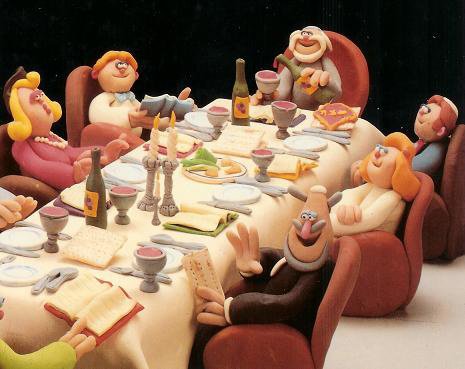|
Passover, perhaps like no other holiday, captures the diverse spectrum of religious and spiritual experience, from one extreme to the next.
For the most observant, the Passover Seder is a solemn time, heavily filled with rules and regulations, rich with layers of customs and meanings, to be followed to the tee with all the stringency of Passover laws.
For many the Seder is not quite as intense. Rather it is a nice, nostalgic experience. A time to get together with family and friends. A time to remember history and celebrate our heritage.
For others the Seder is at best a nuisance and at worst an imposition. Some wonder what are all these traditions all about; others are skeptical as to their contemporary relevance; yet others are apathetic to the whole demonstration, which doesn't carry much significance in their lives; finally, there are those for whom the entire holiday experience is an unhealthy facade concealing an otherwise dysfunctional family life.
For many others it's something in between: A night of tradition, which at times offers some inspiration, but at other times seems hollow and mechanical.
But is there anything more than all the above that makes "this night different than all other nights of the year?"
However you twist it, the Seder nowadays seems to be lacking a vitality that should make it indispensable to our lives. Even those that follow every nuance of the Seder tradition, can appear to be doing so by rote.
After 3319 years since the initial exodus from Egypt, our greatest challenge today is to make the Passover Seder relevant to our lives.
To address this compelling dilemma, this column has attempted to plumb the rich spiritual resources of Torah thought which personalize the Seder experience, rendering it into a powerful psychological/spiritual journey into our own hearts and souls -- a Seder experience as it was always meant to be.
The heart of the Seder, from beginning to end, is comprised of fifteen steps -- each another stage in the process of personal and global redemption which is the essence of Passover.
To make these 15 steps even more palatable, below is an exercise that can help bring the Passover Seder alive.
Remember: Passover in one word is transcendence -- the power to free ourselves from all forms of constraints that inhibit and constrict our lives. The fifteen steps of the Seder – which recreates the Exodus from slavery to freedom – teaches us that transcendence is achieved through fifteen stages, each reflecting a “personality type” which imparts one piece of the Passover transcendence story. Together, all fifteen parts weave a beautiful tapestry, leading us to personal freedom and universal emancipation.
EXERCISE:
Before the Seder begins, each attendee should choose one of the “personality types” listed below corresponding to the fifteen Seder steps. When your respective stage in the Seder comes around, communicate to the group the “personality type” you have chosen to portray.
Be creative and find ways to express your “personality” – role-play, tell a story, or act out the part. Engage the group and invite them to comment – and together, personalize the fifteen steps and bring the Seder alive.
(If you have less than fifteen Seder attendees, each person can play more than one role. If you have more attendees, more than one person can play one personality type.)
1. Kadesh: The Sanctifier: Distinguishes between the holy and the mundane.
2. U'rchatz: The Cleaner: Cleanses the mind, body and heart of clutter and distractions in life.
3. Karpas: The Dipper: Dips and sublimates the material (vegetable) in the saltwater/tears that come from remembering a more spiritual state.
4. Yachatz: The Breaker: Breaks his subjective self to see a broader perspective.
5. Maggid: The Storyteller: Relates the story of life, in dialogue form.
6. Rachtzah: The Washer: Submerges the mind, body and soul, as a prelude to the next steps.
7. Motzi: The Earthy One: Blesses and recognizes that even things earthy (bread) are heavenly.
8. Matzah: The Selfless One: Does not allow the ego (dough) to rise and always remains selfless.
9. Maror: The Empathizer: Feels another's bitterness and pain.
10. Korech: The Binder: Sandwiches selflessness and empathy (steps 8-9) into one experience called life.
11. Shulchan Orech: The Implementer: Sets the table and ensures that that we have all the tools to eat the "meal" of life.
12. Tzafun: The Knower of Secrets: Reveals that which is hidden – the unconscious.
13. Beirach: The Gracious One: Blesses and acknowledges life’s gifts.
14. Hallel: The Praiser: Sings praise and places complete trust in G-d's hands.
15. Nirtzah: The Acceptor: Not action – but complete surrender to being accepted and received by G-d.
|

